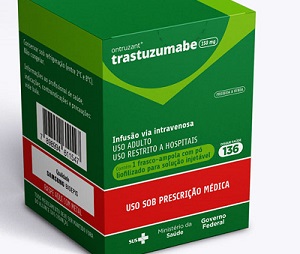Fiocruz produces breast cancer drugs to the Brazilian Health System
21/08/2020
Bio-Manguinhos/Fiocruz
Through its Immunobiological Technology Institute in (Bio-Manguinhos/Fiocruz), the Oswaldo Cruz Foundation is now supplying trastuzumab to the Ministry of Health (MoH), which provides it to cancer patients free of cost through the Brazilian Public Health System (SUSm in the Portuguese acronym). This is another cancer drug supplied by Bio-Manguinhos/Fiocruz, which introduced this line to its portfolio in 2020 (in addition to rituximab, for the treatment of non-Hodgkins lymphomas, large B-cell lymphomas and follicular lymphomas, in addition to rheumatoid arthritis). Trastuzumab is a monoclonal antibody indicated at the SUS to treat a subtype of breast cancer identified by the overexpression of the HER2 gene.

The supply occurs through the Policy for Productive Development Partnership (PDP) and an agreement of technology transference signed with Samsung Bioepsis, owner of the technology, and Bionovis. Through the PDP, Bio-Manguinhos/Fiocruz and Bionovis receive the technology from Samsung Bioepsis and incorporate the biosimilar to their portfolios. The first stage is the import, distribution and absorption of quality control.
The incorporation of the new bio-drug is another of the recent consolidations of the role played by Bio-Manguinhos/Fiocruz in the reduction of technological and productive dependence from external sources, potentializes the financial sustainability of the Public Health System, and provides guaranteed supply to Brazilian patients, also collaborating to the strengthening of the Industrial Health Complex - a strategic necessity confirmed by the current Covid-19 pandemic.
The trastuzumab technology transference stages will also include learning and mastering the production process for Active Pharmaceutical Ingredients (API) in pilot scale at Bio-Manguinhos and, later, ramping up production in industrial scale at Bionovis, strengthening the chain of bio-pharmaceutical innovation in the institutions and in the country. At the end of the PDP, Bio-Manguinhos and Bionovis will produce trastuzumab entirely in Brazil, settling technology mastership and capacity to supply to SUS necessities with a product that is 100% national.
Trastuzumab use in SUS
The PDP between Bio-Manguinhos/Fiocruz, Samsung Bioepis and Bionovis will cater to early and metastatic HER2-positive breast cancer patients in the first line of therapy at SUS, according to the Clinical Protocol and Therapeutic Guidelines of the Ministry of Health.
Breast cancer is categorized in three main subtypes, according to the presence or absenc of molecular markers for estrogen or progesterone receptors and human epidermal growth factor 2 (HER2): HER2-negative (70-80% of patients), HER2-positive (15-20), and triple negative (tumors without the three standard molecular markers, 13-15%). An estimated 67 thousand new cases of breast cases are estimated per year, of which 20% correspond to the HER2-positive type (13,400 cases per year). Eighty percent of these are treated by SUS, which makes about 10,700 pacients.
Biosimilar for oncology
The PDP allows Bio-Manguinhos to include the new biopharmaceutical drug, considered a strategic drug by the Ministry of Health, in its portfolio. Trastuzumab, which will be offered by the public health system, is a biosimilar approved in Brazil since 2019. It ensures the same efficacy, safety and pharmacological profile (pharmacokinetics and pharmacodynamics) as the reference drug.
The Institute already has other biosimilars in its portfolio: etanercept, indicated in the treatment of adult patients with autoimmune diseases, such as rheymatoid arthritis, psoriatic arthritis, and ankylosing spondylitis; somatropin, used to treat hypopituitarism (deficiency of human growth hormone) and Turner (a genetic condition that causes low height in women); and rituximab, used in the treatment of patients with rheumatoid arthritis and also non-Hodgkins lymphomas.
According to Mauricio Zuma, director of Bio-Manguinhos/Fiocruz, “it is extremely important to be able to help increase free access to women, via SUS, to the treatment of the type of breast cancer most common among Brazilians, with the main drug used for HER2+ cases”.
Odnir Finotti, director-president of Bionovis, explains that “to receive and implement the full production technology of trastuzumab, Bionovis is making significant investments on the construction of a world-class industrial plant, on the hiring and training of highly skilled human resources, and on the establishment of laboratories and infrastructure, which will help place Brazil among the countries that have mastership over pharmaceutical biotechnology, a strategic knowledge to ensure that Brazilian patients have access to these drugs and to guarantee the country’s technological sovereignty”. All this effort is already a consequence of the for Productive Development Partnerships, a smart and long-term strategy that has been able to stimulate the establishment of the biotechnological industry in Brazil”.
Same efficacy and safety
The trastuzumab of this PDP maintains the same efficacy, safety and quality profile expected for the reference trastuzumab. The product has successfully passed all comparison tests and clinical trials, requisites adopted all over the world to prove the efficacy of biological drugs. In addition to Anvisa (the National Authority for Health Surveillance in Brazil), this trastuzumab has also been approved by the main drug regulatory agencies in the world, including the FDA (Food and Drug Administration), in the USA; the EMA (European Medicines Agency), in Europe; among others. It was launched in 23 countries and was the first trastuzumab approved in Europe, as well as the only one pre-qualified by the World Health Organization (WHO).


